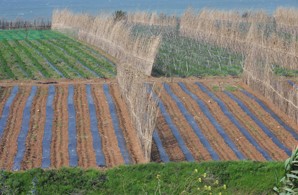
For the people of Morocco, economic growth and social development takes place in a water-scarce environment. With water resources showing significant signs of strain in the poorest rural areas where agriculture constitutes the main source of income, pollution and destructive agricultural practices threaten Morocco’s limited water supply. The population is expected to double over the next thirty years, which will increase demands on water and cause supply amounts to fall further. Continued drought and soil erosion will further add to the urgency for managing Morocco’s water more effectively.
One way USAID plans to increase access to this precious resource is through the Morocco Economic Competiveness (MEC) Program, which will employ a multisectoral approach to reducing barriers to productivity, trade and investment in Morocco. “Improving the business environment, increasing the productivity of irrigation water for agricultural use, and strengthening workforce development among the Moroccan youth are the three core components of the MEC Program,” said Andrew Watson, MEC’s Chief of Party. The program will work to improve the management of water resources by analyzing and recommending better policy and institutional reforms, while examining existing water sources and increasing the supply through the expansion of the use of treated wastewater for agriculture. The $28 million funded initiative will span four years.
MEC’s water component will support the implementation of the Government of Morocco Plan, Maroc Vert, whose goal is to promote sustainable agricultural growth, alleviate rural poverty, and optimize the use of water resources. The Meknès Pilot Project for Reuse of Treated Wastewater was developed to achieve its goal by targeting the implementation of water reforms that lead to better use and efficiency of water resources in irrigated zones, thereby increasing agricultural productivity per unit of consumed water and farmers’ incomes. One of the activities will target the city of Meknès.
The Meknès Pilot Project is extremely important for Morocco because treated wastewater for agricultural use is a key resource for improving productivity in the Agri-Business sectors, especially in areas experiencing persistent water deficits. This northern Moroccan city was an ideal location for the pilot program due to preliminary research studies that were conducted by a predecessor USAID project, Advancing the Blue Revolution Initiative (ABRI). “ABRI served to bring together an international alliance of like-minded stakeholders seeking to transform the culture and governance of water resources in the Middle East and Africa, and has been a great plus for the Meknès Pilot Project,” said MEC’s Program Manager, Jaoud Bahaji of USAID/Morocco.
The response to the Meknès Pilot Project has been positive, but challenging owing to existing institutional constraints. However, it has great potential for demonstrating opportunities to increase agricultural production in other regions and other countries. “The Project will help to enhance agricultural productivity and increase the quality of products offered at market. Its approach is practical, makes sense, and will allow us to link the farmers to the market,” said Mr. Bahaji.
Only in its eighth month of implementation, the MEC Program is positioning itself for future success both in Meknès and in other regions. One of the main challenges that lies ahead will be to determine who has the authority over the water once it has been treated. According to Watson, there is uncertainty in the regulatory framework regarding who or what institution has the authority over the treated wastewater. Other important factors to be considered are the costs to the farmers and guidelines to determine the quality of the treated water, which will be addressed further in MEC’s overall strategy.
By working with technical experts and sharing knowledge from other USAID programs in Egypt, Jordan, and Lebanon on best practices and lessons learned, the Meknès Pilot Project is well positioned for success. “The Pilot Project will not use a cut and paste approach, but will utilize new strategies, while sharing information on common issues regarding water treatment methods,” said Mr. Bahaji. With water scarcity worsening and competition over water resources increasing, reusing treated wastewater is an increasingly attractive option to other cities in Morocco and other countries looking to maintain or expand existing water allocations for agricultural use. The Meknès Pilot Project will continue to address the challenges facing local government and farming communities regarding the uses of treated wastewater and will serve as a pilot project to be replicated elsewhere. “The Meknès Pilot Project will allow the MEC Program to experiment with various approaches to best determine what will be most successful for current and future applications. Our success is important to the region, as treated wastewater is an increasingly valuable resource,” said Watson.
S. Gudnitz







Comment
Make a general inquiry or suggest an improvement.